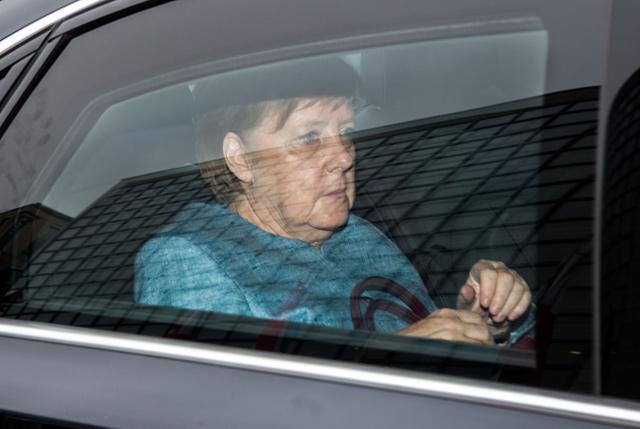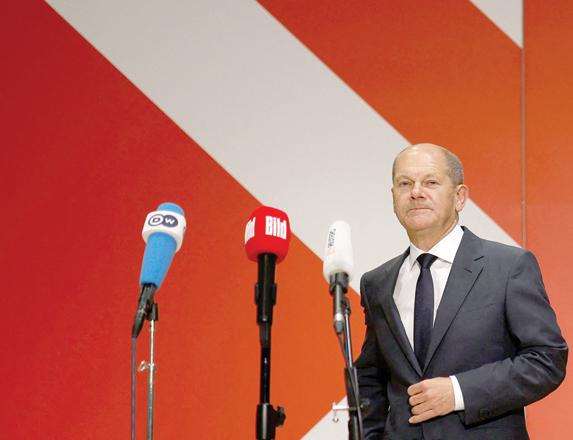You are here
The Greens, Germany’s other party on the rise
By AFP - Oct 11,2018 - Last updated at Oct 11,2018

A demonstration to protest against the Bavarian new law on police duty in Munich, Germany, May 10, (Reuters photo)
BERLIN — While Germany's mainstream political parties are floundering in the face of a right-wing populist onslaught, the ecologist Greens are gaining in popularity and looking to capture once enemy terrain.
Days ahead of Sunday's Bavaria state polls, the one-time hippie anti-party party faces a long unthinkable prospect: scoring big and then joining forces with the arch-conservative CSU Party in the wealthy Alpine state.
Polls there and nationally put the Greens at around 18 per cent, making it the second strongest force in Germany and in Bavaria, a decades-long CSU fiefdom, far ahead of the dispirited centre-left Social Democrats (SPD).
Bavarian public television acknowledged this new reality and, in its only pre-election TV debate, pitted the CSU state premier Markus Soeder against the Greens candidate Ludwig Hartmann, not the SPD's Natascha Kohnen.
The anti-immigration AfD Party, which has surged nationwide in the past three years, also looks to enter the Bavarian state assembly. It is polling at around 10 per cent while the CSU is expected to lose its absolute majority.
This would force the CSU, which promotes crucifixes on classroom walls, to join forces with its traditional ideological foes, whose pioneers a generation ago entered the national parliament flashing peace signs and handing out flowers.
News site Spiegel Online said Bavarian politics show that, aside from the AfD's rise, there is a little-noticed "second revolution ... the rise of the Greens into a mainstream party".
Nappy-changing outdoors man
In Bavaria, the Greens are popular in gentrified inner-city areas but also among conservatives who feel passionate about preserving Alpine vistas.
Voting Green is no longer a cultural taboo for Bavaria's Catholic rural voters because they "can interpret nature conservation as safeguarding creation and a humanitarian refugee policy as an expression of Christian charity", said political scientist Gero Neugebauer.
The Greens have profited from the weakness of Merkel's coalition government but also been energised by a charismatic new male-female leadership duo — Robert Habeck, 49, and Annalena Baerbock, 37, both elected in January.
Under their leadership, the party — which scored just 8.9 per cent in last September's elections — has sought to shed its image of moralising do-gooders and started to tackle long-taboo subjects such as German cultural identity and the loaded term "Heimat" (homeland).
The party is still pushing core Green issues, however, from organic agriculture to protecting species diversity. Where other parties have flip-flopped, on climate and immigration, the Greens have consistently fought for clean energy and against the racist far right.
Die Welt daily has also noted the telegenic appeal of Habeck, an author who cultivates the image of an easy-going intellectual, from Germany's wind-swept coastal north near Denmark.
Habeck, said the newspaper, "comes across as the prototypical Scandinavian outdoors man who will change the kids' nappies and handle the household but also looks good chopping wood".
Greens new bourgeoisie
The Greens were born out of the 1960s and 70s pacifist and anti-nuclear protest movements, and joined by East German civil rights activists after the 1989 fall of the Berlin Wall.
They first entered government in a 1998-2005 coalition under SPD chancellor Gerhard Schroeder that ironically broke with Germany's post-World War II taboo and sent troops abroad, to Kosovo and then Afghanistan.
Another milestone on its march towards the centre came in 2011 when the Greens' Winfried Kretschmann became premier of industrial powerhouse state Baden-Wuerttemberg, a post he still holds.
Over the years German society has adopted many Green values — millions ride bicycles to work, buy organic, oppose GM crops and fracking, have solar panels on their roofs and support gay marriage.
Merkel adopted the Greens' signature policy when, after Japan's 2011 Fukushima disaster, she decided to shutter Germany's atomic power plants.
Her open-door policy for refugees was meanwhile cheered more by Greens than her own often sceptical CDU rank-and-file.
After the last two elections, Merkel held exploratory coalition talks with the Greens which in 2017 collapsed only because a third party, the pro-business Free Democrats, pulled out.
Since that time, noted Spiegel Online, the Greens have steadily gained support at the expense of the SPD and Merkel's CDU.
"The Greens are not the new Social Democrats," it said, "they are the new bourgeoisie."
Related Articles
BERLIN — Chancellor Angela Merkel's long-time allies in Bavaria are on track for their worst ever performance in October elections, accordin
FRANKFURT — Germany inched towards a government led by Olaf Scholz after the Greens and the liberal FDP party said Wednesday they would try
BERLIN — Germany's outgoing Chancellor Angela Merkel on Tuesday distanced herself from Finance Minister Olaf Scholz, saying there was "a hug


















